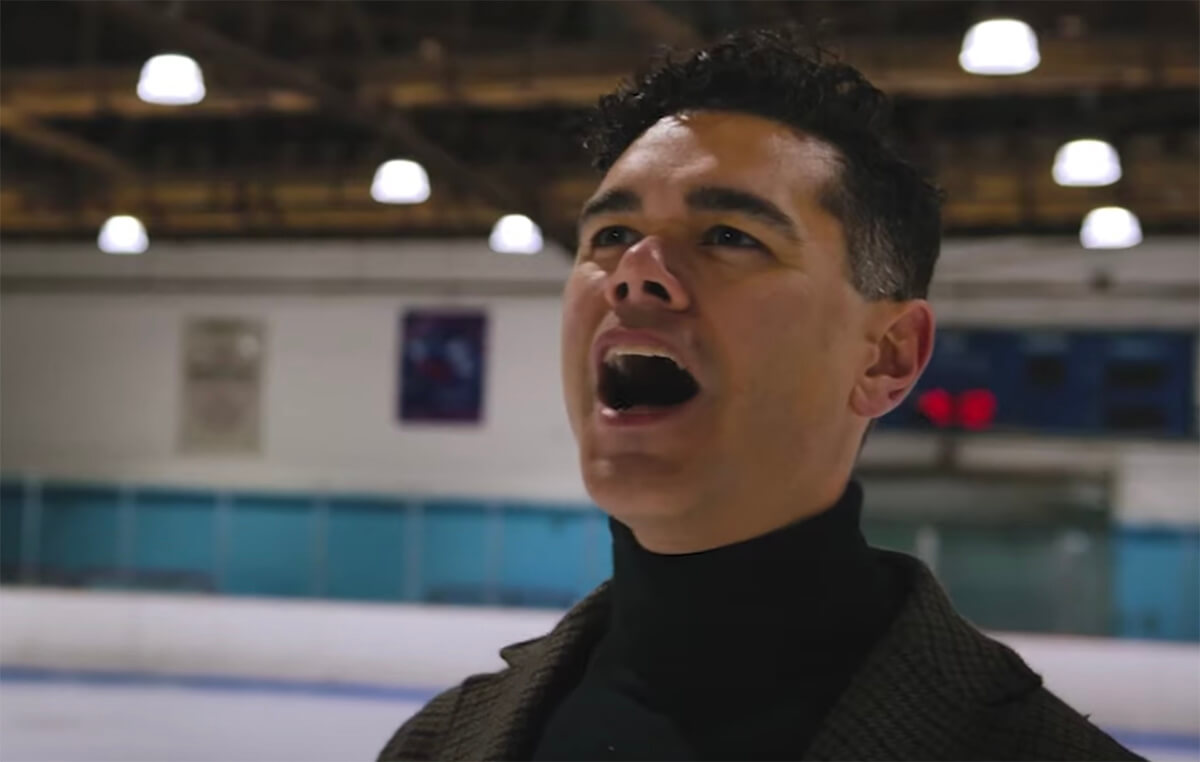
Against the Grain: Messiah/Complex. Streams online at atgtheatre.com. Dec. 13, 2020, through Jan. 7, 2021.
Against the Grain Theatre’s Messiah/Complex unveiled its live stream vision of a Canada present and future last night, but through the challenging lens of a resonant work well-rooted in the past.
AtG’s sprawling vision of a Canada rooted in values of equality and diversity pivoted on select readings of Handel’s texts and music selected from arias and choruses extracted from of the most well-known works in the repertoire, and were well-read into by co-directors Joel Ivany, artistic director of Against the Grain Theatre, and Reneltta Arluk, Banff Centre director of Indigenous arts. If the social media response seemed indicative of anything, the adaptation captivated its very curious audience.
The acknowledgement at the outset that erasures of language and culture were to be deplored as atrocities by all, including those involved in the AtG creative team and artistic collective, set the mood in the title credits. What followed often was breathtaking cinematography filmed from locations across the country by sixteen film and production crews, edited with conspicuous mastery by Stephen Bell and sound design from Doug Doctor, with a crisply resonant albeit reduced Toronto Symphony Orchestra conducted by Johannes Debus. But most notable of all was that each setting seemed offset by equally impactful visual and textual ironies impossible to ignore with their synchronous visual presentations.
While it was eminently pleasing to hear several well-known arias in Handel’s famed English oratorio rendered in a multitude of languages ranging from Dene to Arabic, each individual performance came with a subtle twist in self-deprecating commentary on what the texts would have meant to the colonizers who came to this country long ago, and the performers’ responses to those texts today as they have come down to us in their often-unchallenged socio-political meanings. The results were often surprising, especially responses from Indigenous performers who come from multiple cultures much older and well established in their own profound spirituality than those represented in the texts they were singing.

In our Canadian socio-political landscape, it has often been expressed in a wide variety of official reports through electronic media, and even personally to me, that many in the Indigenous communities continue to voice frustration and defiance in the face of continued erasure and that they “are way past sorry” on these issues. While this is not the view of everyone in the Indigenous communities, it still must be said that paltry attempts at staged apologies from the arts communities, however sincere in intent, are often rightly derided or criticized by many Indigenous artists and writers, even if at some point, grudgingly conceded for their efforts.
It was clear that there was to be no bleated, empty apology on offer here — the issues we face certainly require one — rather the point here was that the creative team put together a true grasp of the intertextual complexity Messiah presents as evinced by its many and diverse participants. Furthermore, the adapted oratorio also presents a model to expand beyond its small number of reworked arias and choruses, showing that it could serve as a self-reflection of wrongs committed, a condemnation of past attitudes, a genuine healing spirit of reconciliation with a sincere joy in the communal vision of the land and cultures we share together.
In short, AtG’s brilliant Messiah/Complex offers a way forward in our conflicted land.

By the end of the livestream, I thought I had viewed a Canada at last which could make me proud, one which seemed to erase borders, defy political conventions of the past and present, and ultimately allowed me to see my country as I had hoped I could begin to one day, as a land populated not by artificial divisions on a map, but one massive territory blurred into mutual co-operation by all its peoples, quilted into an unterritorialized diversity. But such idealism can only come at the cost of doing the hard work of willing to rethink what we think is “normal” within the political sphere before attempting to reshape it to a future goal that can potentially transcend the colonial Messiah complexes which were superimposed on a reluctant land. This seemed to be the quiet, but sure goal of the AtG creative team.
The opening recitative “Comfort Ye” with luminous tenor Spencer Britten (British Columbia) was a telling case in point. The closest element to moving toward a collective re-thinking about our relationships with each other comes early in the line “that her iniquity is pardoned.” Even though the whole Messiah/Complex project was going to raise many of the uncomfortable feelings we have on all sides of the colonial issue, there was going to be at least an atmosphere of forgiveness behind all of it in this production, so that as a nation we could consider how best to move forward. These were some of the most constructive seconds I have experienced in any art form on this topic and led Britten to sing a robust and joyful “Ev’ry valley shall be exalted” as an affirmation of individual identity.
And there were so many similar highlights, often in sublime snapshot with stellar videography. Diyet’s eloquent reworking of “Oh thou that tellest,” now adapted as “Che Yan Nań Käy” in Southern Tutchone, shot against an endless backdrop of majestic Kluane’s stunning mountainscapes, was as natural and beautiful a fit to the melody, even including the added notes to get the text to adapt to some of the extended phrasing, and I enjoyed it very much. It was the appropriate anthem to the Creator, and a worthy transladaptation of the sentiments “get thee up into the high mountain” found in the original aria for low alto. Diyet was wonderful: her focused timbre, a love for sweetness of tone and the most genuine personality one could imagine for any kind of spontaneous performance event. Her voice flowed from her like she was born to share it. Diyet’s voice healed, the first of many I heard during Sunday’s livestream to do so with calming eloquence.

I couldn’t get enough of Andrea Lett’s fluvial talent in “Rejoice greatly, O daughter of Zion” with tone out front in the A section and then dipping into a dark reservoir of richest resonant depth in the B section (“he is the righteous savior”). But it gets deeply disturbing at the words “he shall speak peace unto the heathen” with Lett’s glance casting aside at the awkwardness of the text. I wondered how this would be filmed, and perhaps the best way was to have her sing it directly to the camera. It was chillingly effective.
Numerous highlights included Rihab Chaieb’s moving paean decrying intolerance in “Elle fut meprisée” (“He was despised and rejected”), Looee Arreak’s devotional hymn over a mystical Arctic landscape in the Inuktitut translation of “He shall feed his flock”, Catherine Daniel’s defiantly powerful aria in Toronto’s Graffiti alley “Why do the nations so furiously rage” and finally an ironic twist on “But who may abide” set against the Sherwood Park Refinery, brought to glowing light and tone in front of a raging fire in a remarkable performance by Jonathon Adams. The line “for he is like a refiner’s fire” took on a new and immolating, if not consumptive meaning — a direct warning regarding the destructive nature of our functional duality as stewards of the land and as consumers of its resources.
None was more devastating than Miriam Khalil’s plangent version of the oratorio’s final aria, “If God be for us who can be against us,” here stripped of its triumphalism, much like the St. Raphael’s Catholic Church Ruins where she sang it in a glowing Arabic, prefigured with a traditional chant. It was a pungent warning of how the passage of time eventually lays waste to the sentimentalities of faith when such feelings are allowed to proceed unguarded and ungrounded in peaceable respect for others. Khalil’s performance was visually and musically stunning.
But, it was perhaps the translation into Dene of “I know that my Redeemer liveth”, sung to beautiful effect by Leela Gilday (Yellowknife) which most sublime, set amid a peaceful snowy backdrop with images of a billy pot on an open fire and a stove melting snow for drinking water. Her anthem to the Divine, with its promise of living with her Creator after passing out of this life was stirring and encompassing. It was one of the loveliest moments in the entire performance. Gilday grasped both the essence of the text and the most important goal of Messiah/Complex — to make an offering of a much-needed community healing project on a national scale.
#LUDWIGVAN
Get the daily arts news straight to your inbox.
Sign up for the Ludwig van Daily — classical music and opera in five minutes or less HERE.
- SCRUTINY | Opera Atelier’s Film Of Handel’s ‘The Resurrection’ A Stylish And Dramatic Triumph - May 28, 2021
- HOT TAKE | James Ehnes And Stewart Goodyear Set The Virtual Standard For Beethoven 250 - December 15, 2020
- SCRUTINY | Against the Grain’s ‘Messiah/Complex’ Finds A Radical Strength - December 14, 2020



